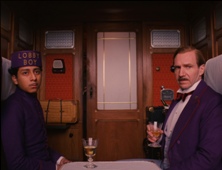Wes Anderson is the only director I can think of that expresses himself primarily through the production design of his films. If you’ve seen a few of his movies, you can recognize the style right away—sets that look like marvelous intricate toys, everything in bold colors, block-like patterns, with the camera either facing the actors head on or from the side, precise geometrical movements, the love of miniatures and marginal details. His films celebrate the sheer visual pleasure of motion pictures—the construction of beautiful worlds on screen that look simultaneously real and unreal. You might think after eight features that this would become tiresome, but Anderson is more than a visual stylist. His screenplays convey a world view, essentially humorous, that is growing more sophisticated and articulate with each film.
His new picture The Grand Budapest Hotel, starts out like a shaggy dog story, with Tom Wilkinson as a revered author telling of his visit to the eponymous hotel as a young man, Jude Law taking over the narration playing that young man, and meeting the mysterious owner of the hotel, Zero Moustafa, played by F. Murray Abraham, who then tells him the story of the previous manager, Monsieur Gustave, played by Ralph Fiennes—and this turns out to be the main strand of the tale, finally.
Despite its name, the hotel is not in Budapest, but in the imaginary country of Zubrowka. In fact the entire story takes place in a kind of alternate Europe of the 1930s. M. Gustave is totally dedicated to his calling as concierge, along with being something of a dandy and a wooer of rich older women. He takes under his wing the younger Moustafa, a lobby boy played by a young actor, a relative newcomer named Tony Revolori. The wild adventures that follow are too complex to explain—in short, M. Gustave gets mixed up in a fight for a dowager’s inheritance that pits him against her unscrupulous family headed by the son, played by Adrien Brody, and his assassin bodyguard, played by Willem Dafoe. The members of the huge cast, many of them Anderson regulars, show up in what amounts to a series of cameos, by everyone from Bill Murray to Jeff Goldblum and Harvey Keitel. But this is mainly a chance for Ralph Fiennes to stretch and show his skill at comedy, which is considerable. He is marvelously funny here, with for instance a habit of making abrupt and sometimes profane about-faces after going into some long explanation or other.
The picture was inspired, we are told at the end credits, by the works of the mid-20th century Austrian man of letters Stefan Zweig. Like that author, Wes Anderson evokes nostalgia for a way of life that perhaps never existed except in the ideals of cultured civilized people. And that’s what M. Gustave represents—humanist civilization, a way of life founded on intelligence, tender emotions, and respect for others. In this, Anderson’s most ambitious and beautiful film, the darkness of modern history seeps in a bit at the edges, just enough to let us feel the loss of something beautiful represented so comically by the hapless, Quixotic, noble M. Gustave. The laughter in The Grand Budapest Hotel is the most comforting kind—the kind inspired by recognizing that childlike goodness still exists in the world.


